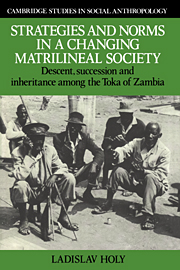 Strategies and Norms in a Changing Matrilineal Society
Strategies and Norms in a Changing Matrilineal Society Published online by Cambridge University Press: 25 August 2009
In Guta and Cifokoboyo, the two areas which have not yet been fully affected by the modern development taking place elsewhere among the Toka, all people to whom an individual can trace a genealogical connection are his or her babululu (kinsmen, sing. mubululu). Within this category he or she distinguishes babululu ba bataata (paternal kinsmen) and babululu ba mama (maternal kinsmen). There is no corresponding collective designation for affines. A distinct category of kinsmen are the basimukowa, the matrilineal kin. They are members of a social category called mukowa or luzubo.
Descent categories
Every Toka is a full member of his or her mother's, and a ‘child’ of his or her father's mukowa. These two mikowa (pl. of mukowa) are distinguished in verbal reference to membership. A Toka whose mother's mukowa is that of Bankombwe (sing. Munkombwe) and whose father's is that of the Bwoono (sing. Moono), refers to his or her membership of the former by saying ndili Munkombwe (I am Munkombwe), or ku mukowa ndili Munkombwe (I am Munkombwe to my lineage). When referring to his membership of his father's mukowa, he says ndili mwaana wa Bwoono (I am a child of the Bwoono) or ku kuzialwa ndili Moono (I am Moono to my birth). Others acknowledge his membership of the Bwoono mukowa by referring to him as Siyamoono. Through his mother and father he is attached to his mother's father's and to his father's father's mikowa.
To save this book to your Kindle, first ensure no-reply@cambridge.org is added to your Approved Personal Document E-mail List under your Personal Document Settings on the Manage Your Content and Devices page of your Amazon account. Then enter the ‘name’ part of your Kindle email address below. Find out more about saving to your Kindle.
Note you can select to save to either the @free.kindle.com or @kindle.com variations. ‘@free.kindle.com’ emails are free but can only be saved to your device when it is connected to wi-fi. ‘@kindle.com’ emails can be delivered even when you are not connected to wi-fi, but note that service fees apply.
Find out more about the Kindle Personal Document Service.
To save content items to your account, please confirm that you agree to abide by our usage policies. If this is the first time you use this feature, you will be asked to authorise Cambridge Core to connect with your account. Find out more about saving content to Dropbox.
To save content items to your account, please confirm that you agree to abide by our usage policies. If this is the first time you use this feature, you will be asked to authorise Cambridge Core to connect with your account. Find out more about saving content to Google Drive.